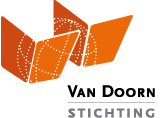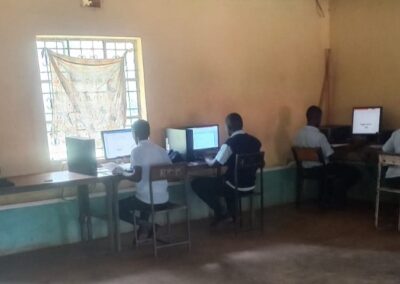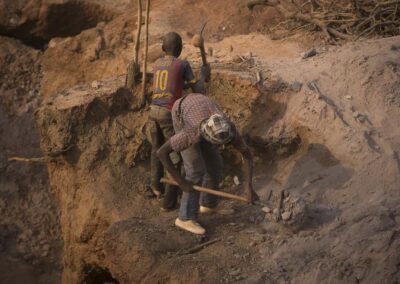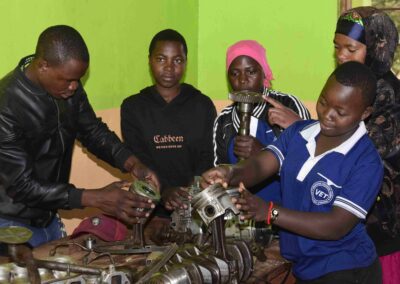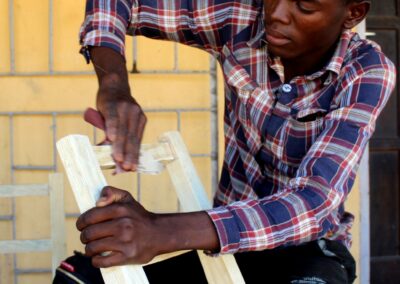In 2016/2017, the Van Doorn Foundation supported the Ebeneza Group in Shinyanga with the expansion of their vocational training center with a woodwork and metalwork training courses.
The support consisted of assisting with the development of a business plan, a curriculum and training modules for the center, with the recruitment of instructors, with the procurement of the teaching materials (wood and metalwork machines and tools), and collecting funds for the purchase of these training tools.
The Ebeneza Group initially struggled to generate sufficient revenue to make this training center profitable, but it has now been put on track.
Project has been executed successfully!
Amount donated: € 10,500.-
Sponsor: The Transpetrol Foundation
Project information
The situation
About 85% of primary school and junior high school students in the Shinyanga Municipal do not go on to higher secondary school. The adolescent youth leaving primary schools (and junior high school) end up jobless, many boys use their bicycles to provide transport in the city (commonly known as “daladala”) many end up smoking marijuana, many girls getting early pregnancy and become sex workers.
The reason is that parents cannot afford sending their children to school. Those who manage to send their children to school cannot provide the necessary guidance and they often have too low marks to pass and continue to higher secondary school. At the same time Shinyanga Municipality does not offer many alternatives; there is just one technical school that does not meet the needs of the target group.
The importance of the project
The Ebeneza Group focuses on the most vulnerable in the community: school dropouts, orphans, disabled and young people living with HIV / AIDS. The Ebeneza Group wants to contribute to the alleviation of poverty, through skills development – in particular for women and young people – that enables them to provide for themselves.
The implementing organisation
The Ebeneza Group is a local, non-governmental and non-profit organization that carries out projects in the Shinyanga region in terms of community empowerment and skill development. The organisation was founded in October 2007 and undertook several empowerment projects, such as dairy farming and poultry skills for women, entrepreneurship skills for women, youth health education, tailor and sewing skill development, and computer application and maintenance training.
The envisaged project results
In 2013 it established a vocational training centre in the Ndala ward of Shinyanga municipality, where tailor and sewing classes are being offered to mainly adolescent girls, as well as computer courses for both boys and girls belonging to the target group. Due to the high demand for carpenters, furniture makers and metalworkers, the Ebeneza Group planned towards the end of 2015 to add courses in woodwork and metalwork to the training centre, expanding thereby the capacity of the centre to a total of approximately 100 young people annually. Van Doorn Foundation was asked to provide funds for the procurement of the necessary machines and tools.
Considerations to accept this request included, among other things, the experience of the Ebeneza Group in running a vocational training centre, maintaining low running cost and low tuition fees, so that the most vulnerable young people actually has and maintains access to the training. But also because the city of Shinyanga is not only the administrative but also the commercial centre for the region. The population of the small towns and villages in the region comes to the city to buy their furniture, doors and windows (of wood or metal); so there is a market, there are a few wood and metal companies, there are employment opportunities.
The project cost was estimated at € 9,600, to which the Ebeneza Group contributed € 1,500, and the Van Doorn Foundation contributed € 8,100-: € 6,800 from the Transpetrol Foundation and € 1,300 for private donations.
The chance of sustainability
The establishment of the centre was not an easy job for the Ebeneza Group among others due to their lack of experience in procurement. In addition, it was not easy to set up a sustainable and financially independent training center. Professional education institutions often achieve financial independence by asking students to pay registration and tuition fees to cover operating costs. However, by doing so they exclude an important target group (disadvantaged young people) because they can not pay such tuition fees.
For the Ebeneza Group, which focuses on disadvantaged young people, introducing tuition fees is therefore not an option. However, it thereby became a huge challenge to make the training center financially profitable.
The progress of the project
The funds are used for the purchase of school furniture, teaching tools for carpentry training courses and welding training courses, and the necessary teaching and learning consumables.
In 2016, the classrooms and a workshop were prepared, the necessary equipment purchased and the teachers appointed for two training programs that have actually been running since the end of 2016: 20 students learning carpentry and 20 students learning welding.
In March 2017 – during the visit of Paul, the project was evaluated jointly and concluded that the project was successfully implemented but only the goal to make the training center financially independent (sustainable) could not be realized within the project period. A strategy was then designed to generate revenue from the sales of products made by the students. This strategy is now being followed and seems successful. Until March, the Ebeneza Group managed to cover only 25% of its operating expenses, in April-June, it managed to double its revenues by the sales of workpieces made by the students of the centre!
The Van Doorn Foundation agreed in March 2017 to pay the salaries of the instructors until the end of 2017, provided that the Ebeneza Group adhered to the agreement to generate income, thus making the training center financially independent. An additional € 2.400 has been made available from the Foundation’s own resources.
The result
All students who started the training in 2016 have completed the training and in July-August a new course will start. The remainder of 2017 will tell whether the Ebeneza Group will indeed succeed in securing sufficient funds from the sales of workpieces, so that it is no longer dependent on sponsors.
For these projects your support is necessary!
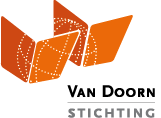
Bedankt!
Bedankt dat je wilt bijdragen aan dit project! Vul hieronder het formulier in en je wordt naar een iDeal pagina gebracht om de betaling te kunnen doen.
